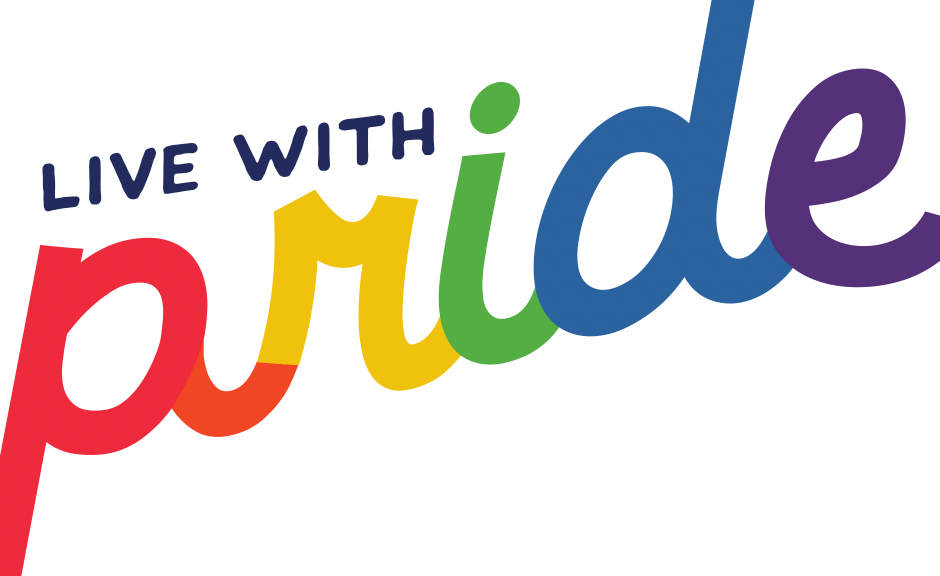
When Pride Becomes a Devil Term: And How We Can Respond
As I’m writing this, it’s the anniversary of marriage equality in the US, and the day of the first Pride Parade in a small city in the Midwest where I’ve resided. Because of these things, I find it fitting to confess that I, like the Supreme Court and that small city, was very late to the party of celebrating Pride Month and Pride Parades. And even, perhaps most sadly, to celebrating my friends’ and LGBTQ+ neighbors rights to celebrate Pride Month.
This development when I DID finally come to the party, belatedly, was after I’d gotten over my unhealthy moral disgusts about respecting much of the rainbow of LQBTQ+ sexuality, mind you (I talked about some of that here). And after I’d gotten over the unhealthy prominence of those few clobber verses in the Bible that are used to call healthy LGBTQ+ relationships “sin” (I talked about some of that here).
I’ve already talked about those previous things in this space, so today I want to point out that the one final hurdle I had to leap through to really celebrate Pride Month was, well, right there in the name.
Pride.
The Views of Pride in My Pastor’s Kid Super-Churched Protestant Upbringing
In my upbringing, it was really really focused on that pride was…bad. Pride was beyond bad.
See, I was Protestant, and moderate, so we didn’t mess much with the seven deadly sins, but yeah, pride was one of those anyway.
One might say that pride was the ultimate sin we’d narrowed everything down to (well, that and sex outside of marriage, it felt like—but that’s another post for another day).
Pride wasn’t just bad, and pride wasn’t just one amongst many deadly sins.
Oops, We Might Have Borrowed a Bit from Greek Tragedy—Ignore that!
Pride was what went before the fall. Never mind that that phrase literally sums up the plot of Greek tragedies, that were not exactly Christian—and that we might have borrowed some of our Christian sensibilities from that along the way.
Pride Was THE Devil Term
So yeah, pride went beyond being one of many sins (which is funny, because that was a huge part of the rhetoric, that all sins were the same in God’s eyes). No, pride was always treated as THE devil term.
I’m not even exaggerating here. Pride, after all, was Satan’s sin—the main thing that led to his fabled fall from heaven (again, ignore the fact that this isn’t a huge clear Scripture theme for a moment, and that we’re building from other sources a bit here).
Pride as Mostly to Be Fought *Internally* According to Christian Nice
Soooo yeah. To be proud was to be of Satan. For anyone to be proud was to be on the edge of satanic, at the least. I mean, we were all sinners, but this was the worst—something to be fought internally at all costs.
(Not really externally, mind you—as I’ve said many times before, we were toxic Christian nice, so we kept our conflict mostly bottled up inside, and directed at ourselves where it belonged, dammit! And we only let it out externally through passive aggression, like the Good Lord intended. It was all super healthy. HEALTHY, I tell you. <end sarcasm>)
Why This Was a Problem—and Also Super-Inconsistent
Looking back at all of this, it really does help me understand how my theology combined with my theological moral disgusts about pride got in the way of my loving my neighbor (I defined moral disgusts most clearly here, if you’re interested).
And it’s sort of curious. After all, I grew up among an educated people as a word nerd. I grew up poring over dictionaries so I could try to beat my mom at Scrabble.
That is to say that I knew perfectly well that most words descriptively had a lot of different meanings. And yet I was incredibly well educated before I could acknowledge that any of the other meanings of pride besides the devil term one—especially those applied in things like Pride Month and Pride parades—might be something to remotely support, much less embrace and celebrate.
NOTE: I say this not to put myself down, but to point out that none of us is fully consistent in our approaches to life. I wanted to acknowledge here my own inconsistency when it came to understanding and prejudice.
How These Views Got in the Way of Embracing Pride Month
That is to say that no matter how many definitions I saw in the dictionary around pride, I internally took FOREVER to actually be able to appreciate Pride Month.
To do so I had to slough off the negative connotations my theological prejudices had put around that chosen name “pride.”
Why These Teachings Were a Problem
And theologically, I’d just like to say what I was taught, mostly by privileged straight males, was just plain incredibly limited in this area.
As I’ve come to understand it, it feels like I grew up with the theology of pride=bad at all times for the same reason I grew up with the theology that conflict avoidance and accommodation are the best most “spiritual” ways of dealing with conflict. (I’ve discussed that past theme here many times, especially starting here.)
Seeing How the Teachings Came from a Privileged Standpoint
See, the voices that have most spoken in my denomination and other prominent denominations throughout history are the voices of privileged people, especially straight men. In my circles, that especially means straight white men.
Now, there’s nothing inherently wrong in being a straight white man, but this position puts you at the top of the heap. It means you’re often interpreting the Bible from the standpoint at the top of a mountain.
How Those with Voices Being the Only Loud Voices Messes Us Up
So, if you find yourself living in the top of a mountain, the willingness to descend that mountain every once in awhile to be among the “common folk”—to be humble—is an important thing.
But hey, wait, what if you don’t live on top of a mountain? What if you live in a valley and you’re constantly being flooded by those throwing water off the top of the mountain?
What if the preaching of the loud privileged voices at the top of the mountain that were taking up all the space were literally hurting your community?
Humility=Great; Humility as a “God Term”=Terrible
See, what if you were sitting down in the valley, internalizing those seemingly wise pronouncements about how you need to just go lower—to humble yourself—and as a result you end up digging yourself and others into an unhealthy hole because of it?
Well, that’s a pretty sh*tty, unhealthy thing, don’t you think?
Unfortunately, this is too often what has happened in the church’s “orthodox” teachings about pride as a devil term to be fought, often inside ourselves, and at all costs, over and against humility as a god term to be defended at all costs and expected of everyone and everything.
Too often this teaching, delivered naturally from people who genuinely do need to come off their own mountain in one way or another, has become a millstone around the necks of those who don’t live on the same mountain–and especially around the necks of those who have been hurt by authoritarianism.
The Problem Isn’t the Teaching, It’s Thinking One Size Fits All
This, I believe, is why that wise verse in the middle of the Bible in Isaiah, when envisioning a healthy and comforting spiritual culture, talks BOTH about valleys being exalted and mountains being brought low.
Pride Month about Building People Up
See, I don’t know—I’m sure there are some egomaniacs that show up celebrating Pride Month–just as every group tends to have its outliers. But overall, from everything I can see, Pride Month is there not to feed people’s egos at all—it’s there to stem the tide of shame and harm by appropriately building people up and giving them space to be themselves.
See, the god term we had been defending at all costs—this humility thing—becomes a problem when it translates as shame for people. (As a quick reminder, shame is stress and can easily turn into trauma that literally hurts people.)
And when you shame people for identity issues that they literally can’t change—conversion therapy is the really evil thing, folks!—that’s not love.
The Bad Fruit of LGBTQ+ Shaming
When all of this this translates into an epidemic of homelessness and suicide for LGBTQ+ youth, for diseases like AIDS going untreated, for finding it a problem to set up a way to honor the deaths of those whose lives were lost to hate at the Pulse night club shooting–well, that’s not loving neighbors as ourselves.
The Big-Assed Piece of Spinach in the Church’s Teeth (Even the Progressive Church Sometimes)
So yeah, I don’t bring this up in order to shame myself or the church for our error as I discuss this. But I do want to point out a big fat central piece of spinach in the Christian church’s teeth in terms of loving our LGBTQ+ neighbors, toward being truly inclusive—and it’s a big one—not about one or two verses that are easily contextualized. It’s about the Christian church’s one-note teachings about pride and humility.
I’m pointing it out today, and drawing attention to how I’d internalized it, because I know sure as sh*t that I’m not alone in internalizing this theological moral disgust. And, again, it’s not that the theology itself is bad—many of us are privileged in one way or another, and we really do need humility in those areas.
But yeah, one type of humility we all should take, is to acknowledge that this humility as a god term over and against pride as a devil term extreme that has wiggled its way into a central place as a “single story” that’s drowned out all the other ways—or definitions, if you will—of these terms.
Going Back to the Heart of Assertive Spirituality
Thankfully, there’s an easy fix: make space for nuance—for multiple perspectives—for more views of pride than just the one. It’s not that the teachings about pride and humility are not useful, it’s just that they’re more useful for some people, some intersectional identities and some situations more than others.
THIS, friends, is what assertive spirituality is all about—making space for multiple voices and perspectives to all live side by side in healthy ways. By turning down the ALL CAPS aggressive shoutiness on the message that we ALL need to be so humble at all times, we can make space for other assertive voices to supplement that vision so we have a fuller featured theology and spirituality that meets the needs of more people and situations.
This is why listening to, and giving voice especially to those who live in the valley, is soooo important to the health and welfare of theology as a whole, but especially the dominant versions of theology.
So Unhealthy to Only Hear Perspectives From the Top—Because We’re All Limited in What We Can Know
See, we’re all naturally limited, and those at the top of the mountain are going to have trouble seeing everything in the picture. Even there, some ARE aggressively prideful, and some are just so socialized into the humility as god term message and some are just ignorant that there are other ways to go about things.
Some Specific Steps to, Well, Repent: For Those Who Have Overly Emphasized This View
As we move forward, I think it’s important not to minimize the harm that this message too loudly shouted has caused—we must apologize for it, in a real way, and truly repent—shifting our behavior going forward.
In other words, for those who identify as Christians, and especially as clergy or speakers, it’s important to make space for the pride=always bad, always to be fought at all costs and to be message ironically to be humbled into a smaller, more situationally applied message.
We need to let it be one of the definitions in the dictionary, not the only definition in the dictionary.
The Good Fruits Of Making More Room for More Views
That will leave much more room for people like me to be able to wholeheartedly love our LGBTQ+ neighbor. Further, it will remove an unnecessary stumbling block toward celebrating with them on Pride Month.
In Which I Go All Biblical-Alluding on You
To riff off of something this Jesus guy said once, it will be removing a log in our eye rather than picking at a speck in our LGBTQ+ neighbor’s eye, and doing so clumsily that it hurts our neighbor in the process.
May those who have ears to hear, let them hear. And let straight folx all genuinely support and celebrate neighbors’ right and joy to celebrate both Pride Month and pride parades should they wish to without tone-policing how that happens. And may we all celebrate and advocate for the rights and further understanding and support of all the varied LGBTQ+ identities however that continues to be needed.
A Final Charge
Go team #AssertiveSpirituality! Let’s continue to do what we can where we are with what we’ve got to work together to soften and supplement unnecessarily loud and unhealthy religio-political messages that cause harm, toward a healthier, more collaborative world for us all. We can do this thing.
Looking for more resources toward speaking up for what’s right and dealing with the conflict that results?
Boy, do we have got a free “Assertive Spirituality Guide to Online Trolls” for you. It actually helps you with conflict both online and off. To get it, sign up for our email newsletter (either in the top bar or by checking the appropriate box when commenting on this article). Once you’ve confirmed your email address, we’ll send you the link to the guide in your final welcome email. You can unsubscribe at any time, but we hope you’ll stick around for our weekly email updates. As soon as we feasibly can we’re hoping to offer more online courses and other support resources for those advocating for the common good, and if you stay subscribed, you’ll be the first to know about these types of things when they pop up.


3 thoughts on “When Pride Becomes a Devil Term: And How We Can Respond”
Thank you!
I have witnessed many of my LGBTQ friends sustain deeply loving, long term relationships over many decades. Over the same time, most of the straight people I know have had multiple marriages. What the deal? The mentioned Pride, being able to accepting who you are and cherishing your beloved same sex partner, is abhorred by some. Perhaps the sin of pride is more profound when ultra-conservative believers would seek to destroy a person’s self-worth and separate them from their god.
These days, I see that often Hell is created here on earth by those who seek a heightened status in the afterlife.
Never stop writing or loose heart. I’m already a subscriber but I’d love love that guide to Trolls. -LW
Thank you so much for this thoughtful, personal, and encouraging comment! The guide to trolls should have been linked in your final welcome email when you signed up–if you’ve kept your emails you might want to look back. If you can’t find it, please either message me through the FB page interface or send me a note to the email that’s noted in the email newsletter and I’d be glad to find time to resend this week if I can. Thanks so much for following! Cheers, DS Leiter
‘
It’s easy to forget that this obsession with having the maximum number of children was originally all about providing the royal family with warriors to defend their power on the battlefield. Bible passages, often taken out of context, were used as to proclaim that God was always on the side of the ruling class. Only the upper-class and clergy were even allowed to read it. Prior to the 1600s, the clergy was made up of the non-first-born who wouldn’t be inheriting their parents’ wealth and power.
Politics has always been about dividing people to obtain power. I think devil terms are all about this.